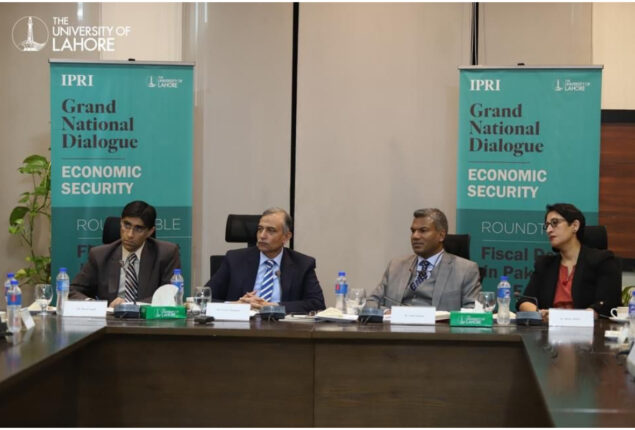Progressive budgetary measures taken to reduce deficits, ensure sovereignty: Miftah
Criticizing the PTI government for damaging the economy, the minister said that...

Fiscal deficits marring growth of the country
LAHORE: The Islamabad Policy Research Institute (IPRI) held a roundtable conference, “Fiscal deficits of Pakistan Economy” as part of the second leg of the Grand National Dialogue, a statement said.
The panel consisted of Dr Maqbool Hussain Sial, Dr Ali Hussnain, Dr Ghulam Ghouse, Dr Fahad Ali, Dr Ummad Mazhar, Dr Akhtar Mansoor, Dr Rafi Amir Uddin and IPRI Economic Security Chair Dr Aneel Salman.
In his opening remarks, National Security Adviser and IPRI Patron-in-Chief Dr Moeed Yusuf said that the economy is the most important for Pakistan. “The rest is all linked with the amount and management of resources we have at our disposal,” he added.
The speakers noted that Pakistan has a serious debt problem and fiscal deficit is a worrisome factor which has hindered growth, and led to spiraling inflation as well as battering of the currency.
The participants observed that the fiscal deficits have been there since 2014, and will continue unless interventions are made at all levels of the government in relation to key policy areas like revenue generation and expenditure management.
Pakistan’s economy has been facing constant fiscal deficits, varying from as low as 2.9 per cent to as high as 12.2 per cent of its GDP. The budget deficit stands widened due to sluggish revenue growth and excessive government expenditure.
To reduce this deficit, governments have been resorting to domestic and international borrowing, and cutting down on spending, which has negatively affected the country’s social and economic growth indicators.
IPRI President Ambassador Dr Raza Muhammed stressed the need for being tolerant and reverent in dealing with the others which will go on to define the national character, as all the stakeholders convince their synergies for putting the economy back on track.
Dr Ali Hussnain remarked that taxation is not voluntary anywhere in the world, and it has come into force with a vigorous and effective collection arm.
According to Dr Fahad Ali, “We must be clear on what can and cannot be achieved.” It was not a good idea to provide subsidies to the sugar industry, he said.
“We need a lot of money to barely keep afloat. With glaring discrepancies in our tax regime, balancing the budget becomes all the more difficult,” he added.
Dr Maqbool Hussain Sial talked about a structural problem marring the country’s agricultural production and productivity.
Dr Akhtar Mansoor said that taxing unproductive sectors and assets is essential for the economy, adding that without it the distribution of wealth and resources will be skewed and unbalanced.
Dr Ummad Mazhar argued that decentralisation is critical to widening our tax net, and that is how the slumping economy can be bailed out.
Dr Rafi Amir said that the discussion of price stability is not complete unless we address it at the lower end of the spectrum.
IPRI Economic Security Chair Dr Aneel Salman said that Pakistan’s economic problems continue to remain the same and have not been navigated accordingly.
The IPRI president emphasised the need for a collective and cohesive approach by the political leadership of the country for resolving the country’s economic problems.
During the event, IPRI signed a memorandum of understanding (MoU) with the Centre for Security, Strategy and Policy Research (CSSPR), associated with the University of Lahore, to facilitate academic collaboration between the two think tanks.
CSSPR Director Dr Rabia Akhtar, and IPRI President Ambassador Dr Raza Muhammed administered the signing ceremony while former National Security Adviser and IPRI Patron-in-Chief Dr Moeed Yusuf was also present on the occasion.
The MoU stipulates initiatives to conduct joint research, publications, conferences and dialogues, and enable scholarly exchanges on a host of security and foreign policy issues.
The express intention is to produce more qualitative research in diverse fields, which is data-driven, enabling scholars and policy-makers to make use of it in a more comprehensive manner.
Catch all the Business News, Breaking News Event and Latest News Updates on The BOL News
Download The BOL News App to get the Daily News Update & Follow us on Google News.